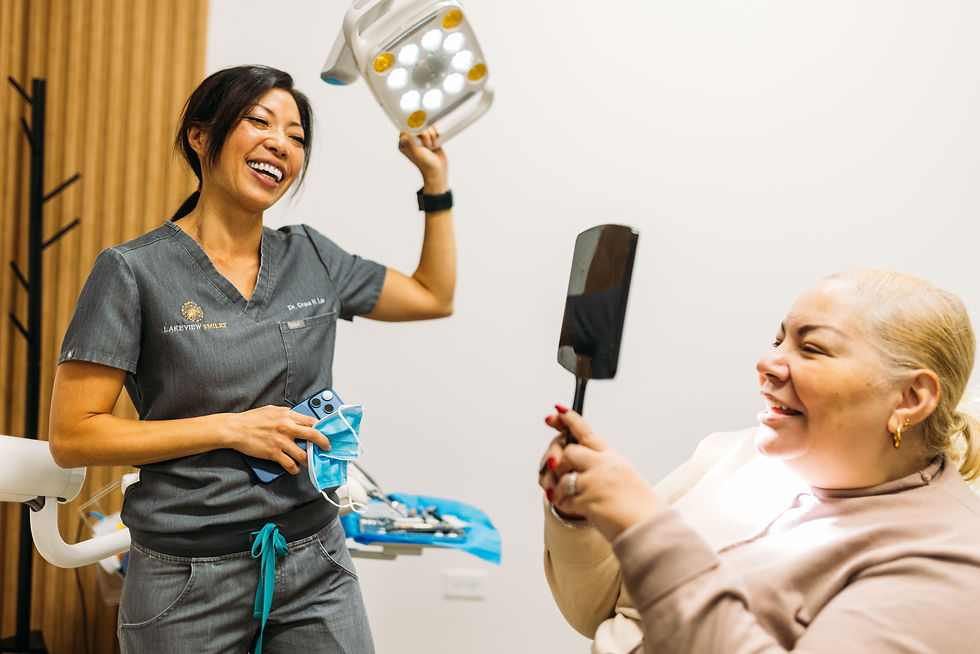


The Lakeview Smiles Difference
Experience personalized, high-quality dental care tailored to your needs. At Lakeview Smiles, we prioritize your comfort, health, and lasting results—because your smile deserves the best.

Our Services
From routine cleanings to advanced cosmetic and restorative treatments, we offer comprehensive dental care tailored to your needs. Experience expert care, cutting-edge technology, and a patient-first approach—all designed to keep your smile healthy and confident.


A Commitment to Your Smile, Confidence, and Care
"I'm passionate about creating whole-mouth health for my patients, and have dedicated my career to serving people through compassionate dentistry.
I thank my patients for the trust placed in me by constantly striving to deliver the highest quality dentistry possible and exceptional customer care."
Dr. Grace Lee

Adam C.
Lakeview
I switched to Lakeview Smiles dental office based off a friend’s recommendation. The staff here is exceptional. Cynthia, who I see most visits, keeps me informed of my dental health status and addresses what procedures can be done for preventative measures.
Lizzie A.
Edgewater
Paige, the admin at the frontdesk is attentive, friendly, and wonderful! She's inquisitive, genuinely interested in patients, and can offer helpful feedback. The reception area offers a hospitable touch with its selection of coffee options and fresh bottled water. Both the hygienist and dentist did an excellent job reviewing my dental plan with me and offering care and treatment.
Claudia S.
Bucktown
1st time going to lake view smile in Bucktown. From the time I called to see if they can see me as an emergency visit to the time I left the office, all the staff was very friendly and empathetic to my pain and situation. Thank you so much.
Enkhzaya B.
Lakeview
Today was my first time. I left the place very happy. They are so professional and explained all possible options for me.
Jesse.
Edgewater
I've had some pretty poor experiences with dentists being pushy, forceful while doing procedures, or staff having poor people skills. However, everyone here was friendly and made sure I was comfortable. The person at the front desk also helped me break down what insurance covered, what costs out of pocket would be, etc. Definitely will be back and recommend Lakeview Smiles for anyone else with dentist anxiety.
Emily B.
Bucktown
The team at Lakeview Smiles is so great! Brandon was my Hygienist and Ace was the Assistant - both were so kind and gentle with my incredibly sensitive teeth. And the front desk staff, Jay and Shane, were super on top of everything and extremely helpful with all my questions. And of course, Dr. Raoof is one of my favorite dentists in town. I highly recommend this team!
Liz C.
Lakeview
I had an amazing experience at Lakeview Smiles. The office was spotless and the atmosphere was very welcoming. Lola and Amanda with beautiful teeth at the front are both incredibly friendly and made me feel at ease from the moment I walked in. Dr. Lee was professional and thorough, explaining each step of the process and answering all my questions. The entire appointment was efficient, and I felt well taken care of. I highly recommend this dental office to anyone looking for top-notch dental care!"
Keyaira S.
Edgewater
I used to be very afraid of the dentist before I started coming here due to past trauma. The Doctor and Staff (I’m bad with names) are all kind and patient with me which is so appreciated. Their service is thorough and efficient as well. I will definitely recommend the Edgewater location!! Thanks you guys.
Missa S.
Bucktown
My first visit here was amazing! The staff here are wonderful and welcoming. Thank you Dr. Shohreh for going over my treatment plan, I was impressed with your professionalism and knowledge. Brandon, you did a wonderful job with the teeth cleaning, it didn’t hurt at all and thank you for not judging me 😂 I even walked over to Walgreens to buy some floss. Jayla, you were very sweet and thank you for taking care of me at the end of my visit. See you soon!

Our Reviews














